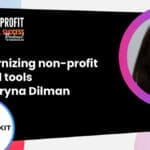Video recording
Audio recording
Google is offering a whopping $10.000 Google Ad grant to non-profit. But what does it mean? How can non-profits make the best out of this opportunity?
In today’s episode, we’re talking with Leo Ebbert, Founder of Exact Click Digital, to discuss about the $10k Google Ad grant and how can non-profits make the best out of it to boost their organization’s message to a lot more people.
Episode
Transcription
David: Alright, welcome to the Non-Profit Digital Success Podcast. I’m your host David and today I have Leo Ebbert on the show. Allow me to introduce him. Leo is the founder and president of Exact Click Digital a boutique agency specializing in Ads management. He began his career as a certified public accountant at Deloitte in Phoenix, Arizona. In 2007, he founded Exact Click Digital in his hometown of Knoxville, Tennessee. Since founding Exact Click Digital Leo and his team have helped dozens of brands drive over a million conversions through paid advertising. I brought him on the show to provide insight about that $10,000 US value from Google Ads grant.
Leo, thank you so much for being on the show today.
Leo: Yeah, thanks, David. Happy to be here.
David: Thanks. How you doing today?
Leo: Great. Yeah, it’s a busy time of year for me, you know, going into fourth quarter, a lot of work that needs to be done, brands are getting prepped for, you know, the holiday run as it’s a busy time of year, but always exciting.
David: Awesome, awesome. So let’s just jump right in. For anybody who isn’t, you know, aware, what is paid advertising?
Leo: Well, it’s space on the Google search engine, if we’re talking about Google, specifically, you know. Where they’re, they’re trying to make money on this search engine, they use it. So they they carve out space for ads, and you can buy the slot, right. So if someone searches for something related to your business or your non-profit, you can say I want to bid on that keyword. And I want to show up in that top section. You know, there will be others bidding on as well, usually. So you might be there with competitors as a way to get instant access to relevant traffic, without waiting for, you know, SEO or anything like that to come into effect, you can get there immediately and get that traffic today.
David: That’s awesome. So can you give us a quick rundown about you know, why non-profits and charities should consider using paid ads?
Leo: Yeah, I mean, yeah, bottom line is it’s, you can get access to highly relevant searches, just like any business might want to do that, you know. A business is selling a widget, and they want to sell that, get in front of people that are searching for that widget. And that’s the simplest, the quickest and usually most effective way to do it. The same is true for non-profits. There are people searching for things, phrases, and words that are relevant to any non-profit. And if you can get in front of those people, then you can bring in whatever your objective or mission is, whether it’s, if you’re trying to find the volunteers, whether you’re trying to find donors, or just get the word out on what you provide.
David: So I think a lot of people have heard Google has these Ad Grants, it’s $10,000 US a month in ad spend. I know they say it’s US, but if you’re in Canada, or Australia, as long as you’re a registered non-profit or charity, right, you can apply for it. How hard is it to qualify?
Leo: It’s not hard, a few restrictions, you know, it’s, for example, if you’re a hospital, you can’t do it. Or if you’re an educational institution, I think you’re also restricted. But there are very few restrictions, and the application process is very simple. You simply fill out a couple of forms, prove that you are a non-profit, it takes them a couple of weeks to review that and get back to you. But you know, once you go through that initial process, you’re off to the races, and you can start running ads immediately.
David: Yeah, I worked at a hospital for just about five years. And the hospital itself couldn’t qualify. But the foundation, the charity, the fundraising arm, was able to qualify for it. Are there any other restrictions or special rules about how the ads grant can be used?
Leo: Not a lot. I mean, those are the kind of the name restrictions as to which types of non-profits qualify, there are some special rules as in, there’s some things you cannot do inside of Google ads that are regular, you know, Google Ads customer could do are many, but one that was kind of surprising to me was you cannot bid on a single keyword. Okay? So just a single word, right? And where that can get a little bit difficult is if the name of your non-profit is a single word. You know, if your non-profit is just one word, and you want to bid on that word, so that you can put an ad out there in front of people bidding on your non-profit, and that’s problematic, you can’t do it. Okay. Now, I’m sorry, a few kind of strange rules like that, but nothing that really, you know, makes it not worth doing by any means.
David: And how would you advise somebody if their organization was called David, right? What would you advise them to do to I guess workaround like that, that single word issue.
Leo: The only thing you can do would be you could bid on, for example, your URL. So if you have the URL, David.com, which if you do, congratulations, that’s probably worth a ton of money. But you can bid on David.com, because that would be considered a single key, the single word, okay? You could also bid on, for example, David non-profit, or something, you’d have to combine it with some other word. But it’s not really that big a deal. Because if people are searching for your brand, or your non-profit, they’re going to find you anyway. But sometimes it’s valuable to defend that space, or to use that space to present a specific message. So you kind of kind of are limited in that regard. But really, most non-profits that are going to use these funds are going to use it for other keywords that are not around their name, the name of the non-profit.
David: So $10,000 US a month, like that’s, that’s huge, right? What does that mean, in terms of, like how much traffic or attraction somebody could get with that.
Leo: It can be a fair amount, and here’s why. Most non-profits, they’re going to be targeting traffic and search phrases that are either not competitive at all, or not very competitive, which means the cost to drive it on a per click basis can be quite low. You can be driving traffic below $1 a click or around $1 per click, which is, you know, is fairly cheap considering the overall landscape of paid ads. So you know, you do the math on that figure out how much traffic you can get. But it can be sizable, I mean, $10,000 per month is nothing to sneeze at. Right? Like you can really drive some highly targeted campaigns that do exactly what you want. And we’ve done that for some non-profits. It has been, you know, quite successful doing it.
David: Yeah, I mean, if, you know, a lot of non-profits that we work with, are fluctuating in around, you know, two, three, five thousand hits a month to their site, they could effectively double or triple the amount of traffic that they’re getting, if they’re targeting the right, the right keywords and the right demographics and, and that type of thing. So I think that’s really great. So is it really too good to be true? Is this like, is this just Google’s way of trying to, you know, give back?
Leo: I mean, to an extent, I guess you could say, it’s not too good to be true in the sense that non-profits can actually, I mean, absolutely tap into this and benefit from it. Of course, you and I both know, Google is all about that stock price and bottom line, right? So there’s the cynical side, they’re getting something out of this, no question. For one, they’re bringing people into the ecosystem getting, you know, hooked, as you might say, on ads, and then, and then maybe 10 grand isn’t enough and you want to spend more, or, you know, these 10 group $10,000 grants could drive up the cost of bids for other people that are actually paying for ads. You know, so yeah, I mean, they’re definitely coming out ahead on this. Overall, I’m positive. But no, it’s not too good to be true for the non-profit’s. It’s a great program and a great way to tap into essentially free money.
David: Yeah, you know, I imagined, you know, their intent, like Alphabet is they’re like, hey, corporation, they’re all about the bottom dollar. Like any, you know, businesses, I imagine they’re treating this as kind of like the gateway drug, hey, you know, like, come in, you know, try this out. And if you get good traction, if you’re using the right keywords, if you’ve engaged, let’s say an agency like yourself, exactly. And it’s generating what you want to achieve from it, that you might go into your pocket above and beyond the $10,000, right.
Leo: Right, right. And we don’t know, honestly, this could be a program that goes on forever. But it may eventually come to an end. And by then you might have 1000s of non-profits that have realized, hey, it’s worth bidding on this traffic, you know, so I suppose Google could flip that switch? I don’t anticipate that or see any indication that they will. But yeah, I’m sure they’re, they’re doing fine with this.
David: Yeah, for sure. I’ve seen some anecdotal evidence from some of our clients that are using the Ad Grants, where, you know, their keywords aren’t showing up as much as some businesses that are paying to play in the space and paying out of their pocket instead of using an Ad grant. How do you feel, and is there any evidence that you’ve seen where paid ads versus the Ad Grants ads are like given equal weighting or is one kind of seen as higher priority than the other?
Leo: Yeah, there’s nothing official I could point to and say yeah, Google has acknowledged “Hey, we don’t weigh this traffic the same” but yeah anecdotally convention kind of seeing some things that maybe make it look like we’re not treated totally equally inside of the the silent auction for the cost per click. But that wouldn’t surprise me. You know, Google’s trying to make a buck on everything. Right? So, their business, that’s what they should be doing. So I wouldn’t be surprised if there was some kind of weight against the Google Ad Grants. But having said that, you know, like I mentioned most of the traffic that not that non-profits are going for isn’t that competitive, right. And so it’s traffic, that is either it’s underbid. In a sense, those, they don’t really have a problem and are seeing them have a problem getting into the traffic, they’re looking to get into.
David: Should a non-profit run ads themselves?
Leo: Sometimes, sure. I mean, if you have someone in house with experience, absolutely, I would say go for it, there’s no reason to go outside, because then that’s real money. So Google Ad Grants are not going to pay for you to hire someone to run the ads for you, right. But so there’s someone in house with experience, I would say, it’s not a bad idea. I would say if you’re not going to use the full budget, if for some reason you think we can’t, what we wrote this is the traffic we really want, and there’s just not that much traffic. So we’re only going to use 1000 or 2000 of it.
First off, my first response would be there, I’m sure is a way to use the full budget. But if you’re not going to use the full budget, it probably wouldn’t make sense to go hire someone and only manage $1000 or $2,000 of ad spend. But the thing you need to remember is that the Google Ads system is designed for the lowest level of experience, alright. And that’s because they have 1000s of, you know, small businesses or small non-profits that want to be able to run ads without bringing someone in house, which is fine, you know, to make it accessible for them. But the downside is, when you don’t know what you’re doing, it leads to tremendous waste, okay, you’ll end up buying traffic that is just not relevant, just not helpful. While you’ll be running ads that are not profitable, or in this case, they don’t they don’t convert the correct way. So there are definitely reasons to bring someone in who knows what they’re doing, you’ll get a way more bang for your buck on the $10,000 Ad Grants than if you’re trying to do it yourself without any experience. That’s just the truth. Because you never, you don’t know what you don’t know. Right? So if you’re trying to run ads, and you don’t know what you’re doing, the odds are you’re gonna waste a huge chunk of that $10,000 Ad Grant.
David: For sure. Is there anything in the system that would help people that are running the ads themselves optimize the ads? So are they just relying on you to kind of like as the lay person, somebody in an organization? Are they are they hoping that you would go in and take a look at the ads and you know, monitor it and modify it over time? Or is there a way that it optimizes to get you the right traffic for those keywords?
Leo: You mean, if someone were running it themselves?
David: Yeah.
Leo: Yeah, There are certainly, yeah, so Google has made a big push on trying to get people into automatic bidding strategies for the campaign setup, and also being pretty aggressive on their optimization suggestions. And in fact, they’re really trying to convince people to check this box that says, “We will automatically accept whatever suggestions Google gives us” instead of automatically implies, right. From my experience, that is a horrible idea, all right. For one, you got to remember, Google’s trying to make money. So their suggestion is usually, “hey, spend more money. Hey, bid higher. Hey, out of all these keywords, we think they’re good keywords” but you look at the keywords and like, yeah, I’m pretty sure that these are not all good keywords. So we don’t want them in there, because it ends up being a lot of wasted traffic. Another thing they do is they really encourage businesses and brands and non-profits alike, to bid on broad match keywords. And there’s a ton of wasted ad spend inside of broad match keywords.
So long answer to your question, but yes, there are suggestions that they offer. There are campaigns that are, you know, for example, smart campaigns that will kind of take all the guesswork out for you route it for you in and allow their system, their algorithm to optimize. But yeah, just realistically, what I’ve seen is there’s a ton of waste inside of that approach. So you have to be careful with it.
David: Do you have any tips or tricks for somebody in a non-profit that, you know, if they’re running their ads themselves, like a quick win that they might be able to take advantage of?
Leo: Yeah, absolutely. I could probably give you four so that if you did these four things, you’d probably be ahead of 90% of the people out there trying to manage ads on their own. Just because you know, people don’t realize how important these things are.
So the first thing I’d say is, if you’re going to bid on your branded traffic, always segment that away from your non-branded, so you’d want to have a campaign that is strictly branded. So if you want to bid on your non-profit name, have that as its own campaign totally separate from any non branded so for example, go back to the example of the non-profit called David non-profit. We’ll bid on David non-profit over here. And then let’s say David non-profit is a food bank, then the separate campaign Food Bank would be considered non branded, because it doesn’t have your non-profit’s name in it. So always segment those. And you would want to use a negative keyword to keep your brand search from showing up in the non branded, okay.
Avoid broad match. And the way it works inside of Google ads is you can say, “hey, Google, here a bunch of keywords, go find me traffic”, that’s called broad match. There’s also phrase match, which says, I want this specific phrase inside of the search. And as long as that phrase is in there, like food bank, then show the ad, right. And there’s also exact match, which would say only this specific search I want to show. So broad match is the one where you live with a lot of searches that are usually, there’s a lot of wasted spend. So focus on phrasing and exact match, okay. And then if you, if you can’t fill up your budget using that, then you could think about going outside and getting some broad match.
Another idea is you would always want to be testing at least a couple of ads at a time inside of each ad group. And the answer is, the reason is pretty simple. You just want to test your messaging and figure out what really is going to drive the result we want. So you want to have an ad that uses messaging A and an ad that uses messaging B, right. And so we’re gonna figure out what messaging really drives, the click really drives the conversion, or whatever we’re trying to achieve. Only way to do that is to have multiple ads running at the same time. And then every so often, when you go in and say, “Okay, this ad is my clear winner, I’m going to get rid of this loser ad and rotate in a new one to see if I can be my winner”, right. So that’s kind of the basic idea of that.
And then the last thing I would say, is take the time to pick a very, this is the most important shot, I probably should have led with this right? Take the time to pick a clear objective, what are you trying to achieve? Do you want people to donate? Do you want people to fill out a form, whatever you’re trying to pick a clear objective and take the time to set up the conversion tracking so that Google Ads knows what’s driving that event, and then you can tie it back to keyword, you can tie it back to the ad, you can tie it back to demographic data. And that’s when you can really start making some powerful optimizations that will make your campaigns work the way you want them to.
David: That was amazing. Those are some four outstanding tips. I hope anybody listening to this can use your insight. You know, it obviously shows that you’re an expert in ads, and you know how non-profits specifically can take advantage of this and work with the platform to be able to help them, you know, reach their mission and achieve their goals, which is really great. You know, this has been really enlightening. I’ve learned some amazing, great tidbits that I can take back to my clients even. And I hope, as I mentioned, that the people listening will be able to get some of that research and your expertise and use it. Use it in their organizations. If anybody wants to get in touch with you, what do they need to do?
Leo: Easiest thing would just be to go to my web website, exactclickdigital.com. And you can book a call with me right there on the site, and sync it with your calendar. And then we could just do a quick intro call, usually not long, 15-20 minutes just to see what your needs are, see if there’s a fit. And then from there, we can decide if it makes sense to work together.
David: That’s amazing. So it’s exactclickdigital.com. Thanks again for joining in Leo. It’s been great having you on the Non-Profit Digital Success Podcast. And to everybody listening, if you want any of the links that Leo’s mentioned or any resources like that, his contact info, just head over to our podcast page at wowdigital.com/podcast. And you’ll see this, this interview in there. And looking forward to hearing from you. Take care and go and enjoy your Google Ad Grants.
Leo: Thanks, David.














0 Comments